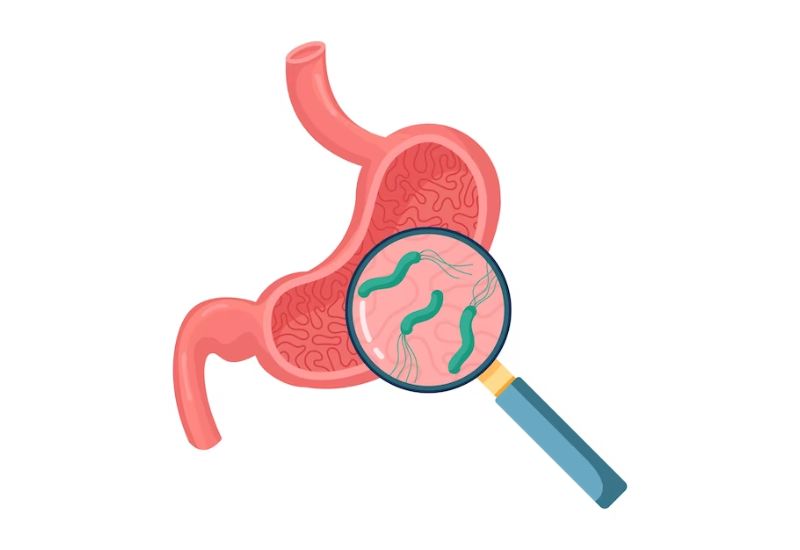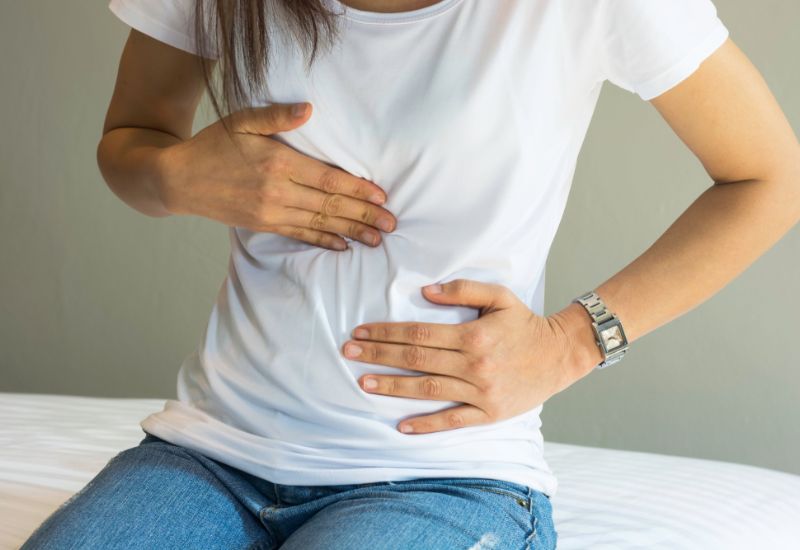Helicobacter pylori (HP) is the leading cause of gastric and duodenal ulcers and can even lead to cancer. Recognizing early signs of Helicobacter pylori infection can help you seek timely medical advice and effective treatment.
1. Overview of HP Bacteria in the Stomach
Helicobacter pylori (HP) is a bacterium that lives and thrives in the stomach lining. It can secrete enzymes and toxins that cause gastric and duodenal ulcers and increase the risk of cancer. However, the presence of this bacterium is not always harmful. Consequently, global guidelines recommend eradicating HP only in specific cases:
– Gastritis associated with MALT lymphoma (a type of stomach tumor linked to Helicobacter pylori infection)
– Gastric or duodenal ulcers
– Early gastric cancer treated with endoscopic resection (EMR or ESD)
– Late-stage gastric cancer patients who have undergone surgery
– Presence of hyperplastic polyps or adenomas in the stomach
– Chronic gastritis with atrophic changes in the gastric lining
– Unexplained iron or vitamin B12 deficiency
– Idiopathic thrombocytopenic purpura (low platelet count)
– Functional dyspepsia
– Long-term use of NSAIDs
– Family history of gastric cancer (immediate relatives)
– High-risk occupational exposure (e.g., mining)
– Patients desiring HP eradication after being informed by their doctor.

H. pylori bacteria can spread rapidly from person to person.
2. Symptoms of Helicobacter Pylori Infection
Most people infected with HP do not exhibit symptoms. However, when HP causes gastric or duodenal ulcers, the following symptoms may appear:
– Epigastric pain: One of the first noticeable symptoms, often felt above the navel, ranging from sharp to dull and persistent.
– Digestive disorders: Constipation or diarrhea with dark, loose stools, possibly with blood.
– Nausea and vomiting: Some patients experience this due to excessive stomach contractions, primarily expelling gastric fluids.
– Loss of appetite: Prolonged untreated gastric ulcers caused by Helicobacter pylori infection can lead to a bitter taste in the mouth and reduced appetite.
– Rapid weight loss: Nutritional absorption is hindered by gastric and duodenal lesions, leading to weight loss and insomnia.

Upper abdominal pain is an early indicator of individuals infected with H. pylori.
3. Progression of Helicobacter Pylori-Induced Gastric Ulcers
Helicobacter pylori infection-induced gastric ulcers can result in severe complications if not promptly treated:
– Gastric bleeding: Ulcers penetrating blood vessels in the stomach, causing black stools or vomiting blood. Prolonged bleeding can lead to life-threatening anemia.
– Gastric perforation: Severe ulcers can perforate the stomach, necessitating emergency surgery to prevent peritonitis, which can be fatal.
– Pyloric stenosis: Narrowing of the pylorus obstructs food passage to the duodenum, causing post-meal vomiting and epigastric pain. Without intervention, it can lead to severe dehydration and electrolyte imbalance, worsening underlying health conditions.
– Gastric cancer: Chronic HP-induced gastric ulcers are a primary cause of gastric cancer, with symptoms often resembling those of common gastric ulcers. Therefore, endoscopic screening is essential for prevention.
4. Treatment and Prevention
4.1 Treatment of HP-Induced Gastric Ulcers
For cases requiring HP eradication, doctors may prescribe a combination of acid inhibitors and antibiotics based on specific protocols:
– First-line treatment (triple therapy): For initial treatment or mild infections.
– Second-line treatment (quadruple therapy): Used when the first-line treatment fails.
– Subsequent treatment protocols: May follow the quadruple therapy or be used initially.
– Rescue therapy: For patients who do not respond to the previous three protocols.
A typical HP treatment course lasts 1-2 months. Adhering strictly to the doctor’s instructions is crucial for the treatment’s success.
4.2 Prevention of Helicobacter Pylori Infection
HP bacteria can spread through various routes, so individuals should adopt preventive measures:
– Eat cooked foods, drink boiled water, and avoid raw foods such as sushi, sashimi, and unwashed vegetables.
– Maintain food hygiene: avoid unsanitary street food vendors, use fresh and clearly sourced food, and avoid spoiled or moldy food.
– Exercise caution around infected individuals: do not share personal items or utensils, avoid feeding each other, and do not pre-chew food for children.
– Wash hands thoroughly before eating and after using the restroom, scrubbing all parts of the hands for 1-3 minutes to eliminate most bacteria.
– Regular digestive health check-ups are recommended once a year to detect and treat Helicobacter pylori infection early if present.

Raw foods contain numerous pathogenic bacteria, including H. pylori bacteria.
This article aims to help you recognize the symptoms and treatment of HP-induced gastric ulcers. If symptoms appear, seek medical advice promptly to avoid severe complications.








